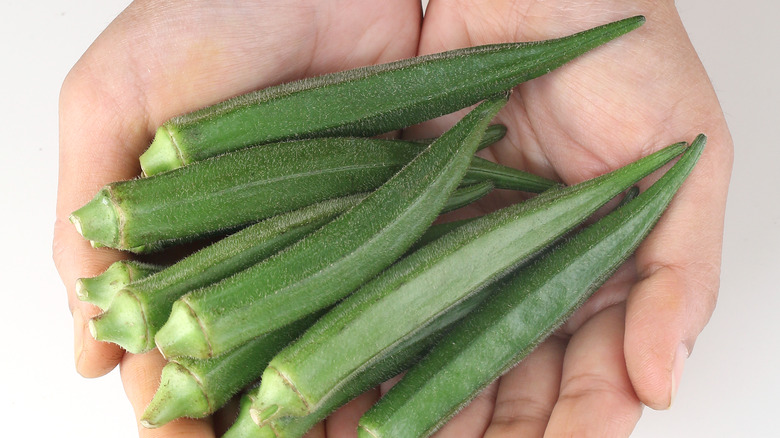The Unpopular Vegetable That Can Lower Cholesterol, Blood Pressure, And Blood Sugar All In One
We may receive a commission on purchases made from links.
Okra isn't just an unpopular vegetable. It's downright invisible to many people. Hey, the poor vegetable didn't even make an appearance in a 2019 Fox News poll of Americans' least loved veggies. Yet okra deserves a place of honor in your kitchen if you're trying to lower your cholesterol, blood pressure, and blood sugar with a single food.
To be sure, okra's questionable reputation across the nation may come from the fact that it's not a mainstay in most American food recipes. Okra doesn't appear to be native to the United States; it's more likely it emerged in Africa and spread throughout the Middle East, where it's far more common (via USA Today). Consequently, many people in the United States haven't developed a palate for the pod-based vegetable. That's kind of a shame, because okra packs some impressive nutritional heft.
To uncover exactly why we all need to give okra a chance to win us over, Health Digest sought out the expert advice of Dr. Chris Mohr, a fitness and nutrition advisor for Fortune Recommends Health. Dr. Mohr's glowing review of okra's widespread health benefits (and impressive nutritional profile) may just have you scrambling to buy an okra-focused cookbook.
A serious cardiovascular system protector
To begin, Dr. Chris Mohr noted that okra, in addition to being quite low in calories, has a substantial amount of dietary fiber. Information from the U.S. Department of Agriculture backs his assertion. Just one cup (or 100 grams) of okra contains 33 calories and 3.2 grams of fiber. In Dr. Mohr's words, that makes the vegetable great for digestion and weight management.
However, fiber doesn't just do wonders for your gut and BMI. It can also be a boon to your cholesterol and blood pressure numbers. In fact, the Mayo Clinic lists fiber as one of the ingredients that can bring down your "bad" low-density liproprotein (LDL) cholesterol by making it harder for the cholesterol to stay in your system long enough to "stick around" your arteries. Similarly, fiber can be an asset if you're trying to fight against hypertension, or high blood pressure.
For instance, a 2023 review in Cureus concluded that there seemed to be enough scientific evidence to support an inverse relationship between fiber and blood pressure. That is, when fiber consumption increases, blood pressure decreases.
Put the brakes on soaring sugar
The fiber in okra may be able to do something else, too: It can keep your blood sugar from spiking and causing problems. That's why the U.S. Centers for Disease Control and Prevention suggest that individuals with diabetes adopt a fiber-friendly diet. A 2021 review from the Journal of Functional Foods explains that a number of trials have shown that eating dietary fiber seems to help regulate blood sugar levels in those with type 2 diabetes, although more research is deserved.
In other words, adding okra to your plate could provide you with a trio of advantages: better cholesterol numbers, blood pressure readings, and blood sugar results. Plus, you'll get much more from the unpopular vegetable. According to Dr. Chris Mohr, okra "contains vitamin C to boost the immune system and vitamin K for strong bones and blood clotting. Okra also has antioxidants that protect against heart disease and other chronic conditions." Basically, it's much more than just another green veggie.
Say hello to a new produce staple
What's not to like about okra? Well, to be honest, it has a notorious downside. Okra's often bypassed because the juice inside each pod has a somewhat gelatinous texture that can turn off first-time okra taste testers. But never fear: There are ways to prepare okra so it tastes fresh, bright, or crunchy rather than slimy.
For example, Dr. Chris Mohr advises grilling or roasting this vegetable for tastebud perfection and zero sliminess. "Slice the okra and lightly cover it with salt, pepper, and olive oil, then grill or roast until crispy," he says. "This brings out the vegetable's natural sweetness without using extra oils." You could also sauté okra with olive oil, garlic, and onions, adding your favorite spices (like cumin or turmeric) for extra flavor.
Dr. Mohr also suggests cooking okra in a tomato-based stew with bell peppers and onions to bring out all the flavors and add heart-friendly vitamin C and lycopene to your meal. (Pro tip: The "slime" inside okra can act as a thickener and won't affect the taste of your finished product, as evidenced in many gumbo cookbook recipes that call for the vegetable as a key ingredient.)
While you don't need to fall head over heels for okra, you might discover that it's what your healthy diet's been missing. And it's never a bad move to try a new, nutrient-packed food to give your meals a little variety.




